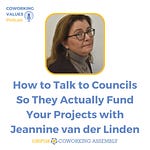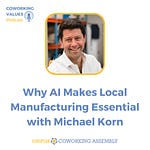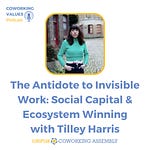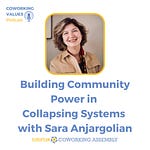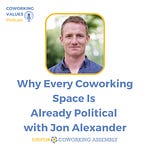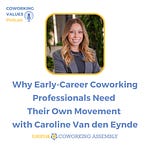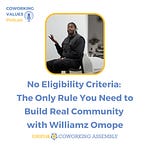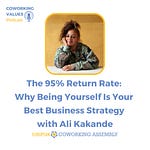"We are the bridge that can make the trust between the system and the association that can make the trust become more vivid."
Episode Summary
The swimming champion had been waiting tables for months.
Nobody in the official integration system had bothered to ask the right question.
They wanted to know about his qualifications, his work history, and his Swedish language skills. All the bureaucratic boxes that fit neatly into government forms.
But when Mikael Johansson's team met him, they asked something different: "What did you do in your spare time?"
That question changed everything. University swimming champion in Syria. Youth coach. Skills that had nothing to do with his CV and everything to do with what Malmö's community needed.
One training session with a local swimming club later, they hired him immediately. His Swedish wasn't perfect, but his skills were exactly what they were looking for.
This is the story of Föreningslots Malmö—literally "Association Guide," but "lots" means tugboat. The small, powerful boats that guide massive ships safely into harbour. That metaphor isn't accidental.
Mikael runs a model that challenges everything we think we know about integration, networking, and how communities work.
Since 1945, Malmö Ideella has been the umbrella organisation for approximately 300-400 member associations, including churches, football clubs, and educational groups.
When refugees started arriving in larger numbers, they didn't just process them through government systems. They created tugboats.
Malmö sits connected to Copenhagen by a bridge, and 185 different countries are represented in one place.
However, what makes it remarkable is that when newcomers arrive, they are not interrogated about their past. They get asked about their dreams.
The ResMove project takes this further, connecting refugees specifically to coworking spaces across Europe.
Not just for the workspace, but for the networks, mentorship, and community connections that make landing in a new country possible.
What emerges is a working alternative to the polarisation and exclusion that defines so much of our current moment. It's messy, human, and surprisingly effective.
Timeline Highlights
[01:08] Setting impossible standards: "I want to be known for having written the world's best novel ever"
[02:03] Malmö revealed: Sweden's third-largest city, bridge to Copenhagen, "185 different countries representing Malmö"
[04:45] From project to permanence: Föreningslots started as asylum seeker support, became essential infrastructure
[06:43] Historical roots: "We started in 1945, in the aftermath of the Second World War"
[08:36] The crucial difference: "Associations don't ask questions about things that maybe are hard to talk about"
[10:51] The bridge principle: "We are the bridge that can make the trust between the system and the association"
[13:46] ResMove's mission: "I see the coworking spaces like a catalyst for these people"
[17:19] Bernie's Faceworks connection: LinkedIn profiles vs CVs and why community matters more
[19:54] The swimming champion revelation: "We asked him about what you do in your spare time"
[22:12] Network multiplication: "If we could help them get more contacts that have more contacts themselves"
[24:50] The tugboat metaphor: "Föreningslots" means association guide, "lots" means tugboat
[26:07] Facing invisible barriers: "There are obstacles when it comes to the economy", and hidden norms
[28:16] Two-way transformation: "We will also help the coworking spaces to be more inclusive"
[29:18] Bernie's insight about feeling seen: "You have to go and invite people one by one"
The Questions Nobody Asks
Government integration programmes ask the wrong questions. They want qualifications, work history, and language proficiency. All the official stuff that fits into databases and funding reports.
Mikael's team asks: "What did you do in your spare time?"
That shift in curiosity revealed a Syrian university swimming champion who'd also coached youth. His Swedish wasn't perfect, but his skills were exactly what the local swimming club needed. After one training session, they hired him immediately.
"No one had asked him about what he had done when he was studying or working; they just asked about those things," Mikael explains. "But we asked him about what you do in your spare time."
The lesson extends beyond refugee integration. Most networking fails because we lead with credentials instead of curiosity about what people actually love doing.
Bernie recognises this from his work in London: "So many people have got jobs they wouldn't apply for, but they've just been in the room and hit it off with someone."
You can't teach networking, but you can create conditions that foster it naturally.
Why Associations Beat Bureaucracy
"Associations don't ask questions about things that maybe are hard to talk about," Mikael explains with quiet conviction.
When you've fled your country, the last thing you need is another interrogation about your past.
Government systems demand documentation, explanations, and proof of who you were before your world fell apart.
Football clubs care about whether you can coach kids. Churches want to know if you play an instrument. Educational groups need help with accounting. The barriers to entry are human-sized, not institutional.
"In general, the associations are much more welcoming to newcomers," Mikael notes. They operate on trust and contribution, not paperwork and background checks.
This insight cuts deeper than refugee work. It reveals how real community integration works for anyone landing somewhere new, whether you're fleeing war or just moving for work.
The Tugboat Principle
Bernie gets visibly excited when Mikael explains the metaphor: "I'm above average excited about that, folks, because here in Vigo, a lot of big container ships and cruise liners come in all the day... There's all these tugboats in the Bay of Vigo guiding these bigger boats in all the time."
Föreningslots translates as "Association Guide," but "lots" specifically means tugboat.
Not the tourist guide you'd hire for sightseeing, but the small, powerful boat that guides massive ships safely into harbour.
Malmö Ideella acts as the tugboat for 300-400 member associations. They know which football club needs a coach, which church group needs someone who speaks Arabic, and which educational association could use help with numbers. Government systems don't have this granular knowledge of community needs.
"We know the associations," Mikael explains. "So we are the bridge that can make the trust between the system and the association that can make the trust become more vivid."
The tugboat doesn't do the work of the big ship. It ensures the boat reaches its destination without colliding with anything.
The Network Multiplication Effect
"If we could help them get more contacts that have more contacts themselves, so the person gets a bigger network, then we have done even more than maybe a lot of governmental bodies are doing."
This is where Mikael's model transcends traditional integration work. It's not about finding one job or making one connection.
It's about connecting people to networks that multiply opportunities naturally.
The swimming coach didn't just get hired. He gained access to the entire swimming community in Malmö—parents, other coaches, sports administrators, and people who might need his skills in completely different contexts.
Bernie connects this to his experience with Urban MBA in London: "You can't teach networking.
You have to let it happen with people, and throwing people together to bump into each other is one of the best things groups like yours can do."
The Invisible Barriers Problem
Even in welcoming communities, obstacles exist. Economic barriers—you can't join the opera if you can't afford tickets. Social barriers—golf clubs with expensive membership fees. Cultural barriers—the invisible norms that nobody explains but everyone's expected to know.
"There are obstacles when it comes to the economy," Mikael acknowledges. "But there is also a challenge when you want to play golf, for example. So there are some obstacles."
Then there's the deeper issue: "We have the problem with the norms in both the society and the association. Both the visible norms and the invisible norms."
Mikael's insight: "We cannot just say that we go to an association and be a part of an activity... We must also do the other part to help the association become even more open."
Integration is a two-way street. Communities need to examine their own assumptions about accessibility, rather than expecting newcomers to figure everything out.
What Coworking Spaces Can Learn
The ResMove project connects refugees to coworking spaces across Europe, but it's not just about access to workspace.
"I see the coworking spaces like a catalyst for these people," Mikael explains. Not just a place to work, but where dreams become achievable through human connections.
Where someone might find a mentor who knows how to start a company, or a collaborator who needs their specific language skills.
The model challenges coworking operators to think beyond membership fees and hot desks.
How do you become a tugboat for your community? How do you create conditions for organic networking rather than forced networking events?
Bernie's connection to Faceworks illustrates this perfectly. When Ukrainian refugees arrived in London, well-meaning volunteers tried to teach CV writing. But CVs are intimidating in any language, let alone a second one.
What worked was LinkedIn profile workshops—more informal, more visual, more aligned with how people find opportunities now.
The Two-Way Transformation
"We will also help the coworking spaces to be more inclusive," Mikael explains.
The ResMove project isn't just about helping refugees access coworking—it's about helping coworking spaces understand how to be genuinely welcoming.
This acknowledges something most inclusion efforts miss: the problem isn't just that marginalised people don't know how to access opportunities. It's that the opportunities weren't designed with them in mind.
Bernie captures this in his observation about feeling seen: "It's one thing to say everybody's welcome, but you have to go and invite people one by one and not announce things.
Go and ask people, go and let people know they are welcome rather than just emailing them."
Broadcasting welcome messages isn't enough. Real inclusion happens through individual invitation, personal attention, and genuine curiosity about what people bring to the table.
Beyond Refugee Integration
What makes Mikael's model powerful is how it reveals the mechanics of community integration for everyone. The Syrian swimming coach's story isn't just about helping refugees—it's about how we all find our place in new communities.
Most of us have been the newcomer somewhere. Starting a new job, moving to a new city, joining a new community.
The feeling of not knowing the invisible rules, not understanding how things work, not knowing who to talk to or how to contribute.
The questions that unlock belonging aren't about credentials. They're about curiosity: What do you love doing? What are you good at? What would you do if resources weren't a constraint?
When Mikael says associations "strengthen the person's belief... in getting more contacts that can help them maybe fulfil a dream," he's describing something universal.
We all need places where our contributions matter, where our skills are valued, and where our dreams are taken seriously.
The Historical Thread
Malmö Ideella started in 1945, "in the aftermath of the Second World War, and a lot of people came from different parts of Europe to Malmö, and then a lot of youth associations wanted to create more activities for these youth."
The refugee crisis didn't create the model—it revealed the enduring wisdom of it. For nearly 80 years, this city has been figuring out how to welcome newcomers through association life rather than bureaucratic processing.
What worked for displaced Europeans in 1945 continues to work for Syrian refugees in 2024. The technology changes, the languages change, but the human need for belonging, contribution, and community remains constant.
The Catalyst Principle
"I see the coworking spaces like a catalyst for these people," Mikael says about ResMove participants. Not a destination, but an accelerator for whatever they're trying to achieve.
This reframes our entire perspective on the workspace. It's not about providing desks and WiFi. It's about creating conditions where dreams become achievable through human connections.
The Syrian swimming coach found his place through a sports club, not a coworking space. But the principle is the same: match people's gifts with community needs, create opportunities for organic networking, and remove barriers to participation.
What This Means for Community Builders
Mikael's work offers a blueprint for anyone building community, whether it's refugee integration, coworking space management, or neighbourhood organising.
Start with the right questions. Ask about dreams and spare time activities, not just qualifications and work history.
Understand your role as a tugboat. You're not doing the work for people—you're helping them navigate safely to where they can do their own work.
Address barriers honestly. Economic obstacles, social norms, invisible rules—acknowledge them and actively work to remove them.
Think two-way. Don't just help newcomers adapt to your community; help them thrive. Help your community become a more genuinely welcoming place.
Focus on network multiplication. One good connection leads to many others. Your job is to create the first connection and trust the network effects.
Links & Resources
Mikael Johansson's Work
Föreningslots Malmö: Association guide and refugee integration model
Malmö Ideella: Umbrella organisation for 300-400 associations since 1945
Nobel21: Additional project work
Mikael Johansson on LinkedIn
Projects & Community
Bernie's Projects
AI for Coworking Quiz: Free assessment tool for coworking spaces
Coworking Values Podcast: LinkedIn showcase page
LinkedIn Coworking Group: 8,000+ member community
Workspace Design Show: February trade show and conference in London
Unreasonable Connection Events: Monthly online gatherings for coworking operators
Bernie's LinkedIn: Connect directly
One More Thing
Coworking brings communities together, helping people find and share their voices.
Each episode of the Coworking Values Podcast explores Accessibility, Community, Openness, Collaboration, and Sustainability—values that shape the spaces where we gather, work, and grow.
If this resonates with you, rate, follow, and share the podcast. Your support helps others discover how coworking enriches lives, builds careers, and strengthens communities.
Community is the key 🔑




